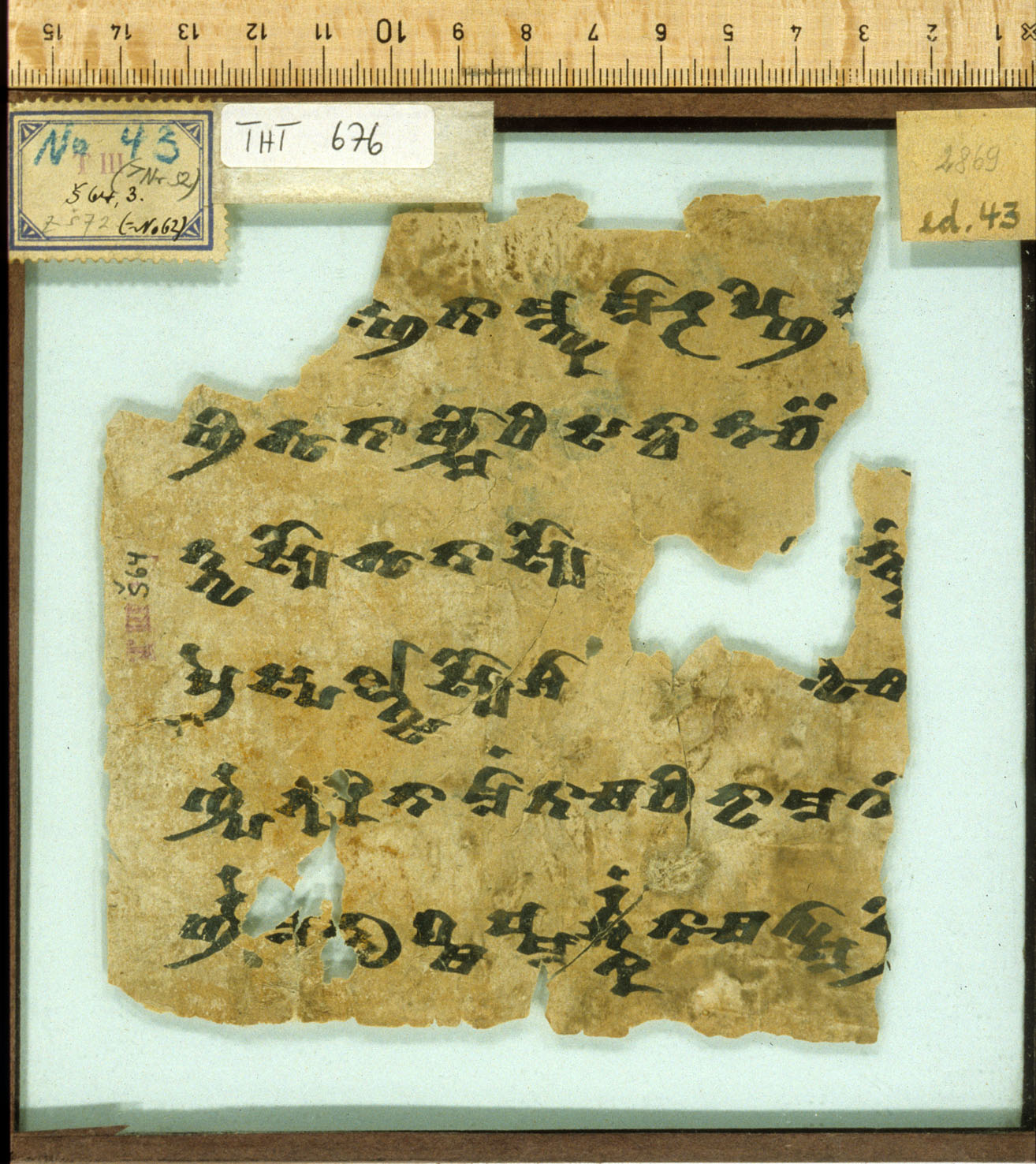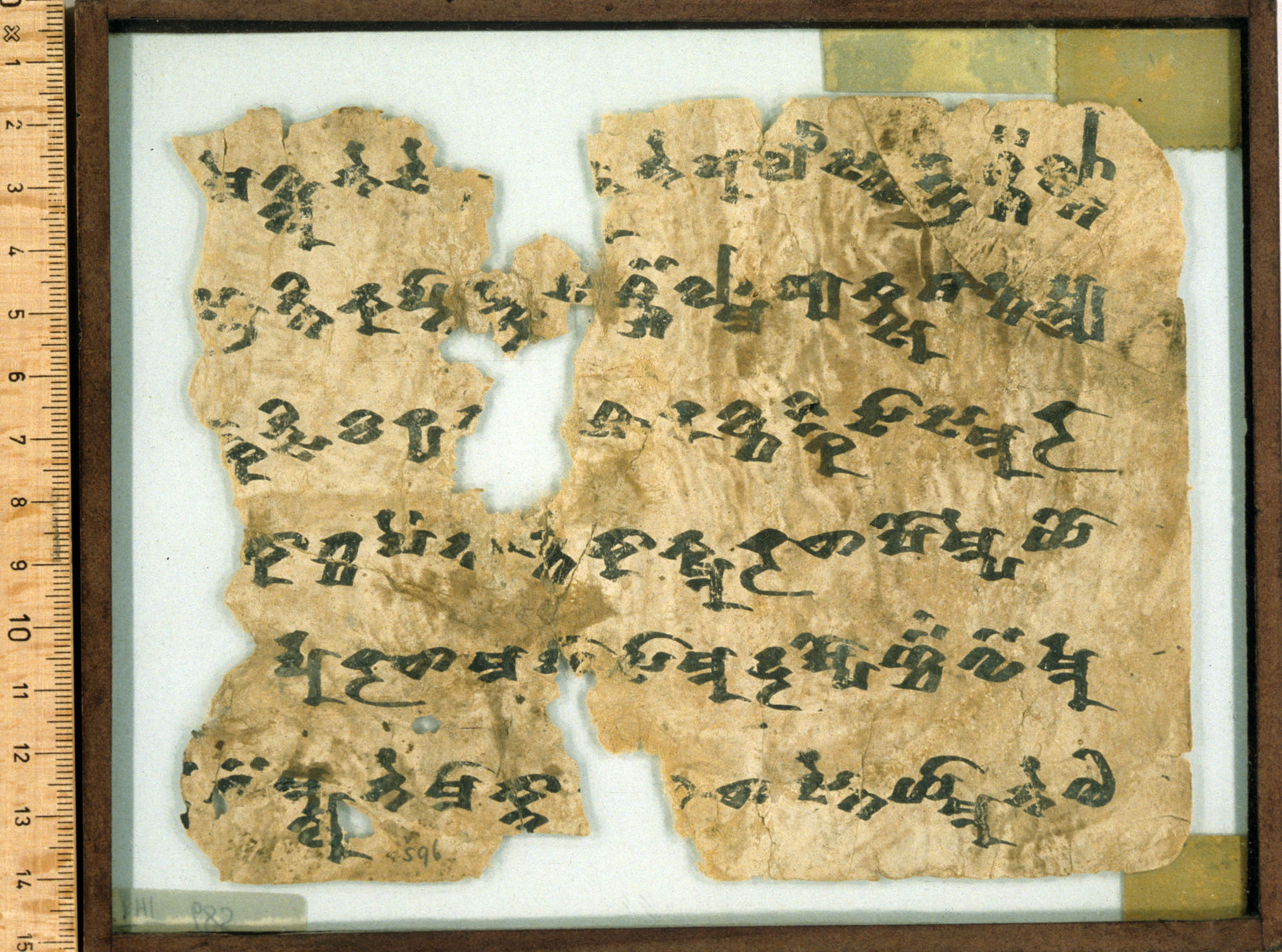Work in progress
A 43 and 52
| Known as: | A 43 and 52; A 43 = THT 676; A 52 = THT 685 |
|---|
| Cite this page as: | Gerd Carling; Georges-Jean Pinault; Melanie Malzahn. "A 43 and 52". In A Comprehensive Edition of Tocharian Manuscripts (CEToM). Created and maintained by Melanie Malzahn, Martin Braun, Hannes A. Fellner, and Bernhard Koller. https://cetom.univie.ac.at/?m-a43 (accessed 04 Jul. 2025). |
|---|
Edition |
| Editor: | Gerd Carling; Georges-Jean Pinault; Melanie Malzahn |
|---|
| Date of online publication: | 2013-10-03 |
|---|
Provenience |
| Main find spot: | Shorchuk |
|---|
| Specific find spot: | Stadthöhle |
|---|
| Expedition code: | T III Š 64.03, T III Š 91.09 |
|---|
| Collection: | Berlin Turfan Collection |
|---|
Language and Script |
| Language: | TA |
|---|
| Script: | classical |
|---|
Text contents |
| Title of the work: | Avadāna |
|---|
| Passage: | Bhūta sea monsters [Buddha and turtle shell] |
|---|
| Text genre: | Literary |
|---|
| Text subgenre: | Jātaka/Avadāna |
|---|
| Verse/Prose: | prose; verse |
|---|
| Meter: | 554443 (4x) |
|---|
Object |
| Manuscript: | A 1-54 |
|---|
| Material: |
ink
on paper |
|---|
| Form: | Poṭhī |
|---|
| Number of lines: | 6 |
|---|
Images
Transliteration
| lf | 100 20 1 |
|---|
| lf1 | 100 10 |
|---|
| a1 | (– –) sñ(·) tā mwu mā¯ ¯r pñi [n](·) /// /// – : 1 || knā nmāṃ pe – (–) [¯]m wra¯ ¯m sā mu dta rṣi |
|---|
| a2 | ñi bhū tā ñbo dhi sa tvā na¯ ¯cä /// /// ntu || ṣe ra śi ni ṣkra mā ntaṃ || ā ptā spa |
|---|
| a3 | twa syo bhū tā syo ○ – ts[ka]ṃ /// /// ra syo yo ṣmo ṣnu¯ ¯nt : ṣo kyo e mpe le sta |
|---|
| a4 | pre spa ltsa syo śā ○ we¯ ¯s /// /// [sy](·) klā tñi wmā¯ ¯[r] śā waṃ ske ya syo pu kbhū tā |
|---|
| a5 | ñpe nu ri nā māṃ tā¯ ¯m ci ndā ma ṇi /// /// śpā lmeṃ kra¯ ¯nt ā ṣtraṃ ā rta ntsā psā mā rpkā mā |
|---|
| a6 | rñe m(·) ntu tma ṣma rśkaṃ tā¯ ¯m wmā rr[i] /// /// ṣtaṃ tā ṣya s·· (– –) nā ca¯ ¯r na ṣpa rmā tā¯ ¯m • |
|---|
| b1 | wmā rtā [pa]¯ ¯rk ma tta kri tā mā¯ ¯r tma¯ (–) /// /// me wlu ne s[n]e [w](·) [skl]u ne ṣu li stsa ṅkra śśä ltā |
|---|
| b2 | skmāṃ wā kma tsaṃ ta mpe wā tsaṃ tsra /// /// spra tti ka ptā ñkt[a] sa śśä lmā ṣya ktsu ma¯ ¯nt plya |
|---|
| b3 | skeṃ ṣiṃ wā ka¯ ¯m ○ yne [ś](·) /// /// ṅka tsi ka rya [t](·) (–) śā ra kta ṅki sā smu ra¯ |
|---|
| b4 | ¯s̝ cwa ṅke yā śkaṃ ○ [a] [ś](·) /// /// kā cca peṃ n[a]¯ ¯s̝t kā kmu ra¯ ¯s̝ ṣo mpe yo |
|---|
| b5 | ca kra vā rṣu li smrā caṃ kā¯ ¯rp – /// /// rpu ra¯ ¯s̝ ma hā sā mu dra ṣpo ñcäṃ wä rmu |
|---|
| b6 | (– –) – ā rwa rśä¯ ¯m tma ṣsā mu /// /// (·)[m](·)ṃ cä mplu ne mā knā (–) [na]¯ ¯s̝ sne ymuā ne o |
|---|
Transcription
Translation
| a1 | ... this jewel ... merits ... |
|---|
| a1+ | Knowing also the object ... the Ocean's ... Bhūta [monsters] (went?) to the Bodhisattva ... (the Bodhisattva says:) |
|---|
| a2 | In [the tune] ṣeraśi-niṣkramānt: |
|---|
| a2+ | "Previously through ... ... [1a] Through very horrible, high... |
|---|
| a4 | .., through big ... brought me the jewel; |
|---|
| a4+ | through huge efforts, all the Bhūta [monsters] also desiring [it], (took away) this cintāmaṇi [jewel]. |
|---|
| a5 | [1c] ... Gather |
|---|
| a5+ | and bring jewels in excellent [and] pure ārtänts! |
|---|
| a6 | Beyond this do not de(sire) this jewel! ... |
|---|
| a6+ | Even if at [the] (present) time you desire this one, it is I that nevertheless desire this jewel myself now. |
|---|
| b1+ | Thereupon ... comparable to the summit of the mountain (without) trembling [and] without shaking the excellent, powerful, strong (Bodhisattva?) ... the excellent meditation not shared with the ... Pratyekabuddhas desirous (to appear in the world) [and] (to make) [it] manifest, having gathered [his] garment close [about] [his] loins and ... having taken the shell of a turtle, with one foot he descended to the top of the mountain Cakravaḍā. |
|---|
| b5+ | ... having (de)scended he stood ready to pour out the whole water from the Ocean. |
|---|
| b6 | Thereupon the (Bhūta [monsters] of the) Ocean ... because of not under(standing) the excellent capacity (of the Bodhisattva) [and] not showing re(morse) ... |
|---|
Other
| a6+ | Ich jedenfalls werde dieses Juwel jetzt selbst suchen. (Schmidt 1974: 149-50) |
|---|
Commentary
Remarks
| * | Transcription and translation are based on Carling et al. 2009. |
|---|
| * | Transcription and references have been transferred from the "Text and Reference Database of the Tocharian A Language" (Gerd Carling Lund University) (funded by the Bank of Sweden Tercentenary Foundation and SCAS). |
|---|
| * | Number 121 is written on the margin of the verso side, but the number 110 (sic!) inside the string hole, the latter by a different hand in careless script. Note that deviating numbering between margin and string hole is also attested for the series A 15 to A 24 which belongs to the same manuscript. There the difference is likewise between nine and ten numbers, the string-hole number being the lesser one. |
|---|
Philological commentary
| * | Both fragments were joined by Siegling in his personal copy, where he further noted on p. 26: "den von den Meer-Wesen gestohlenen Cintāmaṇi erhält der Bodhisattva zurück, da er das Meer auszuschöpfen droht mit seiner Schildkrötenschale." (The Boddhisattva receives back the Cintāmaṇi that has been stolen by the sea creatures after threatening to scoop out the sea with his turtle shell bowl.) |
|---|
| n1 | About 10 akṣaras are missing between the fragments. Siegling's proposal in his personal copy of Sieg and Siegling 1921 pe(nu ca)m is impossible since nu is not an option; fremdzeichen m is possible but uncertain. |
|---|
| n2 | About 10 to 12 akṣaras are missing between the fragments. The tune has 4x25 syllables (5/5/8/7). |
|---|
| n3 | The dot at the end of the line interrupts a sentence; rather, it is a number one that has been misplaced during copying, since it is missing after pāda 1d. |
|---|
| n5 | The ligatura ‹yma› with a second ‹u› is peculiar; it hardly represents yumā; rather it is a misspelling for yāmlune. |
|---|
Linguistic commentary
| n4 | The reading ṅkatsi is certain; accordingly, the form can only be an infinitive of a verb with present III or IV. Such a verb is as yet unattested in TA, but it could be the first attestation of the TA equivalent of TB präṅk(ā)- 'to restrain' or tsäṅk(ā)- 'to arise', more likely the latter. |
|---|
References
Miscellaneous
Online access
IDP: THT 676, THT 685; TITUS: THT 676, THT 685
Edition
Sieg and Siegling 1921: 26, 29; Sieg and Siegling 1921 p. 26, p. 29
Translations
Schmidt 1974: a6 b1 (149-50)
Bibliography
Carling et al. 2009
Carling, Gerd, Georges-Jean Pinault, and Werner Winter. 2009. A dictionary and thesaurus of Tocharian A. Volume 1: Letters a-j. Wiesbaden: Harrassowitz.
IDP
“The International Dunhuang Project: The Silk Road Online.” n.d. http://idp.bl.uk.
Schmidt 1974
Schmidt, Klaus T. 1974. “Die Gebrauchsweisen des Mediums im Tocharischen.” PhD, Universität Göttingen.
Sieg and Siegling 1921
Sieg, Emil, and Wilhelm Siegling. 1921. Tocharische Sprachreste, I. Band. Die Texte. A. Transcription. Berlin/Leipzig: de Gruyter.
Sieg and Siegling 1921
Sieg, Emil, and Wilhelm Siegling. 1921. Tocharische Sprachreste, I. Band. Die Texte. A. Transcription. Personal annotated copy of Wilhelm Siegling. Scanned by Douglas Q. Adams with the technical assistance of Michael Tarabulski and Kevin Dobbins. Berlin/Leipzig: de Gruyter.
TITUS
Gippert, Jost, Katharina Kupfer, Christiane Schaefer, and Tatsushi Tamai. n.d. “Thesaurus Indogermanischer Text- und Sprachmaterialien (TITUS): Tocharian Manuscripts from the Berlin Turfan Collection.” http://titus.fkidg1.uni-frankfurt.de/texte/tocharic/thtframe.htm.






